“Every time I send out the rainbow – whether it’s for a rainbow baby or just for a child’s room – I have so much joy,” smiles Sarah Niland, as she speaks about the macrame rainbows she crafts in Co Galway with love, care ... and litres of tea.
Joy. A feeling many take for granted. Not Sarah.
Because when she experienced what she now recognises was postnatal depression, it seemed all joy was lost.
“The only way I can describe it is all my family and friends, my house and my beautiful baby, were all under this dark cloud, and I couldn’t see through the dark cloud,” she explains.
But having summonsed the courage to reach out for support, Sarah is sharing her story so that other mothers who may be struggling know they are not alone; and that there is help and hope.
Devastating loss
Originally from Killarney, Co Kerry (“a townie!”), Sarah lives near Headford, Co Galway with her husband Doug and children Finn (4) and Elodie (2). The couple met on their first day working at the same hotel and like many, went backpacking before getting engaged, buying their house and tying the knot.
Starting a family was always on their agenda, but they struggled to fall pregnant.
“I was so convinced that as soon as you want to get pregnant, it was going to happen,” says Sarah, who was later diagnosed with polycystic ovary syndrome and referred to a fertility clinic in 2017 to help regulate her cycle.
Almost miraculously, she soon found out that she was expecting, but at an early scan, the couple were devastated to learn there was no heartbeat.
“I spent days in bed, just bawling,” recalls Sarah. “I was just at that stage where you feel: ‘If I wish it hard enough, they’ll be okay.’”
An ERPC (D&C) was scheduled. But while Sarah still remembers the hospital staff’s kindness, she felt she “couldn’t talk to anyone” about how deeply she grieved her loss.
“I was terrified people would belittle me for being so upset,” she explains. “As soon as you see ‘pregnant’ on a pregnancy test, you imagine a life. You imagine what they might look like and whether it’s a boy or a girl. They’re so real … and all of a sudden, it’s just stopped.”
Antenatal anxiety
Following her loss, Sarah’s GP suggested counselling, but she convinced herself she was “fine”. In May 2018 – having left her job in the stressful world of retail – Sarah discovered she was pregnant again. Creeping anxiety, however, slowly smothered her excitement.
“All I did was sit and think: ‘Don’t lose the baby.’ The anxiety just encased me. It was constant worry; but I never told anybody,” says Sarah, who didn’t want to appear to be “failing” at pregnancy.
Eventually, Sarah told her mother that she was struggling to stay positive. As they shared a mutual love of crafts, she sent her some ideas from Pinterest to help her focus on something more positive.
One project – a decorative macrame rainbow – stood out due to its significance as a symbol for rainbow babies (a baby born following pregnancy loss).
“I said: ‘I need to make a rainbow for my baby’s room to remind me of how strong I am and to remind me of the baby that is not with us, but always there,’” explains Sarah.
Fortunately, the pregnancy went smoothly, but their little boy, Finn, made a dramatic entrance in an emergency c-section when Sarah’s waters broke five weeks early. Before he was whisked away to the neonatal intensive care unit (NICU), Sarah was only able to spend a short but precious spell with her baby.
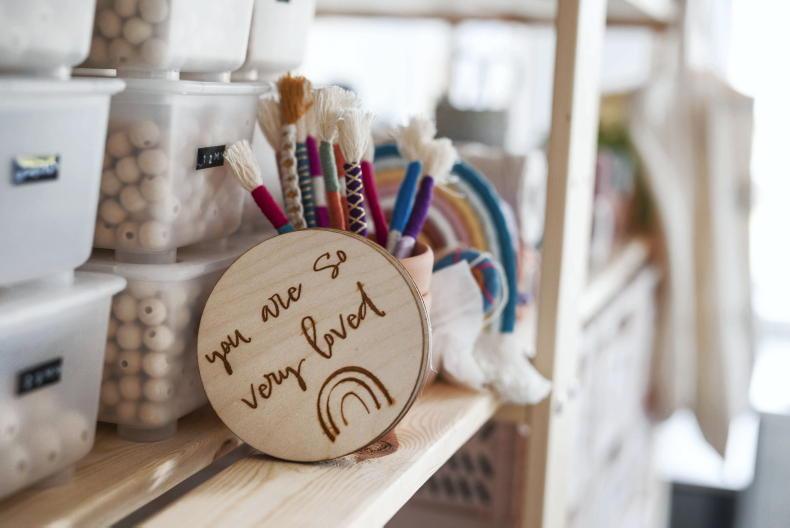
Rudaí Olla was imspired by Sarah's love of crafts \ Claire Nash
“It was the week before Christmas, they had twinkly lights all along the ceiling and I just had my baby in my arms and my husband was beside me and I was just like: ‘This is it, I’ve it done, I’m over the hard hurdle,’” she recalls of her initial relief.
Postnatal struggle
Due to her surgery, Sarah was unable to follow Finn to NICU until the following day. Looking back, she feels the seeds of postnatal depression were scattered then.
“All of a sudden, I’ve gone to baby in my arms, twinkly lights, husband beside me, to an empty room,” she explains. When she was physically able to go to NICU – while struck by the amazing care – she found it very “intense”. Being discharged from hospital without Finn was especially difficult, but fortunately, after nine days, he came home on Christmas Day.
Sarah hoped things would settle once they were in their own environment, but Finn was vomiting a lot in the early days and Doug had to go back to work soon afterwards, often not finishing late hotel shifts ’til the small hours.
Unable to drive due to her C-section and all alone with the baby for long periods in the depths of winter, Sarah soon found that her world “got very small”.
“I basically lived in my sitting room. I barely went upstairs. And because it was so dark outside, you didn’t even feel like there was the rest of the world. It was just you in your sitting room and your pumping machine [for breast milk] trying to keep this little person alive,” she says, explaining that her mind would race with fears that something would go wrong.
Again, she felt unable to tell her loved ones how she was really feeling.
“I kept saying to myself: ‘Every other mom can do it, why can’t you do it? You wanted the baby for so long and you lost a baby, and you still can’t do it.’”
Once Sarah could drive, she would make the hour-long pilgrimage to Salthill to pace the prom with Finn, but returning home became more difficult. At the height of her distress, Sarah was unable to sleep, and would get up at night in secret to clean the house. About five months after Finn was born, she went “to a very dark place”.
“I was very lucky I never wanted to hurt Finn,” she says, tearfully. “I just felt that he would be better off without me.”
Turning point
Fortunately for Sarah, at around this time, she had an issue with her C-section wound. On her mother’s advice, she went to her GP. What happened next changed everything.
“She said: ‘Sarah, how are you though?’ It was from her soul, looking at my soul, and I just broke down,” she says.
“I never told her how dark it got, but I just said I was very lonely, I was very sad and everything felt very dark and negative. I said: ‘I feel like I’m failing as a mom.’ And she was like, ‘No… you are depressed and it can be fixed.’”
With support from her GP, Sarah arranged to attend counselling and also agreed to a follow-up appointment to consider medication, but in her case, talk therapy proved effective.
One of the most important things she learned was that she did not have to hide her feelings for fear of upsetting people.
“[The therapist said] if Doug was feeling the way you’re feeling, would you want him to keep it to himself? And I said: ‘Jesus, no!’ And she said: ‘Exactly,’” says Sarah.
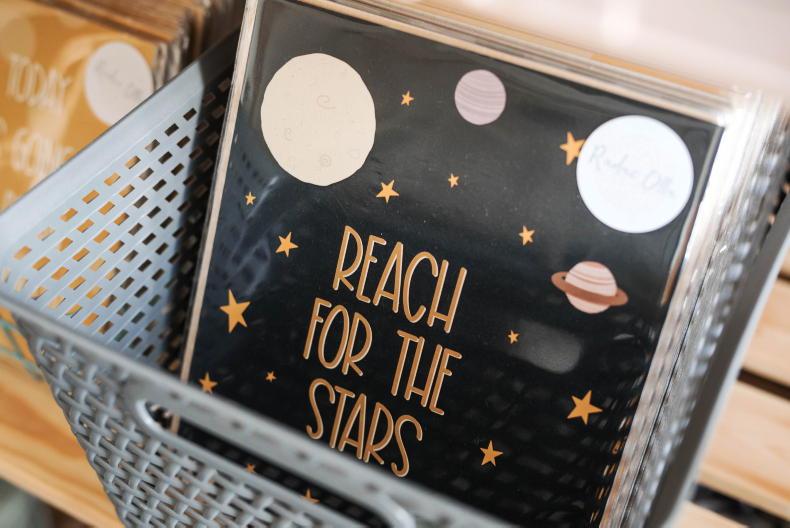
Sarah has expanded her product range to include cards \ Claire Nash
Sarah also came to realise that it was okay to ask for help and make time for herself. During one session, her therapist asked what she enjoyed doing, outside of motherhood. The rainbow she made while pregnant immediately came to mind.
But?
“I said: ‘Sure, what am I going to do, fill my son’s room with crafts?’” she recalls. “And she said: ‘Well, why don’t you sell them?’”
Rudaí Olla
Christening her craft business Rudaí Olla (“woollen things” as Gaeilge) Sarah set herself the goal of making 10 rainbows for sale.
“I opened an Instagram page, I posted a picture, I got a few followers and that day, one of my best friends messaged me and said: ‘I’d like a rainbow,’” recalls Sarah.
“She had just lost a baby and she said: ‘I want a rainbow for my rainbow baby.’ And I remember the excitement of getting an order and being able to make something so special for somebody else that had the same experience.”

Sarah Niland's signature rainbow \ Claire Nash
Rudaí Olla grew organically, but in spring 2020, Sarah discovered she was pregnant again.
“The first place I went to is: ‘What if I get depressed again?’” she says. But thanks again to therapy, Sarah could tell her loved ones how she was feeling.
“I wasn’t afraid to turn around and say: ‘I’m not doing okay today, I need you to take the baby for a walk’, or ‘I’m absolutely shattered, I need to go and lie down’, or ‘I need to go and knit,’” she explains.
The fear of returning to hospital did loom large, especially as Sarah felt her postnatal depression was triggered by the circumstances around Finn’s birth and NICU stay. But while her daughter, Elodie, made a swift entrance that December, the experience was so positive that Sarah says it was “like coming up for air”.
“It wouldn’t have been possible if I hadn’t gone to counselling,” she acknowledges. “I had my tools, I knew to ask for help, I knew my feelings were okay.”
Similarly, the same tools helped to ease the transition home. A major difference second time round, however, was that Doug had retrained in human resources during COVID-19 and was able to swap shift work for a more family-friendly nine-to-five role.
Since then, Sarah has continued to grow Rudaí Olla, adding products such as tote bags and cards, and selling online, at markets and through independent gift shops. She admits she suffered from “imposter syndrome” for a long time, but she is finally proud to call herself a business owner.
“For me, personally, it is the best thing I’ve ever done for myself,” she says.
Sharing hope
It was also through Rudaí Olla that Sarah began to talk about postnatal depression on social media and realised how little the subject is spoken about.
“A lot of the time we’re led to believe that we just need to ‘get on with it’ and just figure it out for ourselves. That’s not the case at all,” she says.
“It’s scary to think that if I had not spoken to my doctor that day, life would not be the way it is now. And all I had to do was talk.”
And Sarah hopes that by sharing her story, anybody who is struggling will be encouraged to seek help; and find their own rainbow.
“Underneath the cloud, your happiness is all still there,” she smiles. “And waiting for you to come back to it.”
Visit https://rudaiolla.ie/ or follow @rudai.olla on Instagram
“Every time I send out the rainbow – whether it’s for a rainbow baby or just for a child’s room – I have so much joy,” smiles Sarah Niland, as she speaks about the macrame rainbows she crafts in Co Galway with love, care ... and litres of tea.
Joy. A feeling many take for granted. Not Sarah.
Because when she experienced what she now recognises was postnatal depression, it seemed all joy was lost.
“The only way I can describe it is all my family and friends, my house and my beautiful baby, were all under this dark cloud, and I couldn’t see through the dark cloud,” she explains.
But having summonsed the courage to reach out for support, Sarah is sharing her story so that other mothers who may be struggling know they are not alone; and that there is help and hope.
Devastating loss
Originally from Killarney, Co Kerry (“a townie!”), Sarah lives near Headford, Co Galway with her husband Doug and children Finn (4) and Elodie (2). The couple met on their first day working at the same hotel and like many, went backpacking before getting engaged, buying their house and tying the knot.
Starting a family was always on their agenda, but they struggled to fall pregnant.
“I was so convinced that as soon as you want to get pregnant, it was going to happen,” says Sarah, who was later diagnosed with polycystic ovary syndrome and referred to a fertility clinic in 2017 to help regulate her cycle.
Almost miraculously, she soon found out that she was expecting, but at an early scan, the couple were devastated to learn there was no heartbeat.
“I spent days in bed, just bawling,” recalls Sarah. “I was just at that stage where you feel: ‘If I wish it hard enough, they’ll be okay.’”
An ERPC (D&C) was scheduled. But while Sarah still remembers the hospital staff’s kindness, she felt she “couldn’t talk to anyone” about how deeply she grieved her loss.
“I was terrified people would belittle me for being so upset,” she explains. “As soon as you see ‘pregnant’ on a pregnancy test, you imagine a life. You imagine what they might look like and whether it’s a boy or a girl. They’re so real … and all of a sudden, it’s just stopped.”
Antenatal anxiety
Following her loss, Sarah’s GP suggested counselling, but she convinced herself she was “fine”. In May 2018 – having left her job in the stressful world of retail – Sarah discovered she was pregnant again. Creeping anxiety, however, slowly smothered her excitement.
“All I did was sit and think: ‘Don’t lose the baby.’ The anxiety just encased me. It was constant worry; but I never told anybody,” says Sarah, who didn’t want to appear to be “failing” at pregnancy.
Eventually, Sarah told her mother that she was struggling to stay positive. As they shared a mutual love of crafts, she sent her some ideas from Pinterest to help her focus on something more positive.
One project – a decorative macrame rainbow – stood out due to its significance as a symbol for rainbow babies (a baby born following pregnancy loss).
“I said: ‘I need to make a rainbow for my baby’s room to remind me of how strong I am and to remind me of the baby that is not with us, but always there,’” explains Sarah.
Fortunately, the pregnancy went smoothly, but their little boy, Finn, made a dramatic entrance in an emergency c-section when Sarah’s waters broke five weeks early. Before he was whisked away to the neonatal intensive care unit (NICU), Sarah was only able to spend a short but precious spell with her baby.

Rudaí Olla was imspired by Sarah's love of crafts \ Claire Nash
“It was the week before Christmas, they had twinkly lights all along the ceiling and I just had my baby in my arms and my husband was beside me and I was just like: ‘This is it, I’ve it done, I’m over the hard hurdle,’” she recalls of her initial relief.
Postnatal struggle
Due to her surgery, Sarah was unable to follow Finn to NICU until the following day. Looking back, she feels the seeds of postnatal depression were scattered then.
“All of a sudden, I’ve gone to baby in my arms, twinkly lights, husband beside me, to an empty room,” she explains. When she was physically able to go to NICU – while struck by the amazing care – she found it very “intense”. Being discharged from hospital without Finn was especially difficult, but fortunately, after nine days, he came home on Christmas Day.
Sarah hoped things would settle once they were in their own environment, but Finn was vomiting a lot in the early days and Doug had to go back to work soon afterwards, often not finishing late hotel shifts ’til the small hours.
Unable to drive due to her C-section and all alone with the baby for long periods in the depths of winter, Sarah soon found that her world “got very small”.
“I basically lived in my sitting room. I barely went upstairs. And because it was so dark outside, you didn’t even feel like there was the rest of the world. It was just you in your sitting room and your pumping machine [for breast milk] trying to keep this little person alive,” she says, explaining that her mind would race with fears that something would go wrong.
Again, she felt unable to tell her loved ones how she was really feeling.
“I kept saying to myself: ‘Every other mom can do it, why can’t you do it? You wanted the baby for so long and you lost a baby, and you still can’t do it.’”
Once Sarah could drive, she would make the hour-long pilgrimage to Salthill to pace the prom with Finn, but returning home became more difficult. At the height of her distress, Sarah was unable to sleep, and would get up at night in secret to clean the house. About five months after Finn was born, she went “to a very dark place”.
“I was very lucky I never wanted to hurt Finn,” she says, tearfully. “I just felt that he would be better off without me.”
Turning point
Fortunately for Sarah, at around this time, she had an issue with her C-section wound. On her mother’s advice, she went to her GP. What happened next changed everything.
“She said: ‘Sarah, how are you though?’ It was from her soul, looking at my soul, and I just broke down,” she says.
“I never told her how dark it got, but I just said I was very lonely, I was very sad and everything felt very dark and negative. I said: ‘I feel like I’m failing as a mom.’ And she was like, ‘No… you are depressed and it can be fixed.’”
With support from her GP, Sarah arranged to attend counselling and also agreed to a follow-up appointment to consider medication, but in her case, talk therapy proved effective.
One of the most important things she learned was that she did not have to hide her feelings for fear of upsetting people.
“[The therapist said] if Doug was feeling the way you’re feeling, would you want him to keep it to himself? And I said: ‘Jesus, no!’ And she said: ‘Exactly,’” says Sarah.

Sarah has expanded her product range to include cards \ Claire Nash
Sarah also came to realise that it was okay to ask for help and make time for herself. During one session, her therapist asked what she enjoyed doing, outside of motherhood. The rainbow she made while pregnant immediately came to mind.
But?
“I said: ‘Sure, what am I going to do, fill my son’s room with crafts?’” she recalls. “And she said: ‘Well, why don’t you sell them?’”
Rudaí Olla
Christening her craft business Rudaí Olla (“woollen things” as Gaeilge) Sarah set herself the goal of making 10 rainbows for sale.
“I opened an Instagram page, I posted a picture, I got a few followers and that day, one of my best friends messaged me and said: ‘I’d like a rainbow,’” recalls Sarah.
“She had just lost a baby and she said: ‘I want a rainbow for my rainbow baby.’ And I remember the excitement of getting an order and being able to make something so special for somebody else that had the same experience.”

Sarah Niland's signature rainbow \ Claire Nash
Rudaí Olla grew organically, but in spring 2020, Sarah discovered she was pregnant again.
“The first place I went to is: ‘What if I get depressed again?’” she says. But thanks again to therapy, Sarah could tell her loved ones how she was feeling.
“I wasn’t afraid to turn around and say: ‘I’m not doing okay today, I need you to take the baby for a walk’, or ‘I’m absolutely shattered, I need to go and lie down’, or ‘I need to go and knit,’” she explains.
The fear of returning to hospital did loom large, especially as Sarah felt her postnatal depression was triggered by the circumstances around Finn’s birth and NICU stay. But while her daughter, Elodie, made a swift entrance that December, the experience was so positive that Sarah says it was “like coming up for air”.
“It wouldn’t have been possible if I hadn’t gone to counselling,” she acknowledges. “I had my tools, I knew to ask for help, I knew my feelings were okay.”
Similarly, the same tools helped to ease the transition home. A major difference second time round, however, was that Doug had retrained in human resources during COVID-19 and was able to swap shift work for a more family-friendly nine-to-five role.
Since then, Sarah has continued to grow Rudaí Olla, adding products such as tote bags and cards, and selling online, at markets and through independent gift shops. She admits she suffered from “imposter syndrome” for a long time, but she is finally proud to call herself a business owner.
“For me, personally, it is the best thing I’ve ever done for myself,” she says.
Sharing hope
It was also through Rudaí Olla that Sarah began to talk about postnatal depression on social media and realised how little the subject is spoken about.
“A lot of the time we’re led to believe that we just need to ‘get on with it’ and just figure it out for ourselves. That’s not the case at all,” she says.
“It’s scary to think that if I had not spoken to my doctor that day, life would not be the way it is now. And all I had to do was talk.”
And Sarah hopes that by sharing her story, anybody who is struggling will be encouraged to seek help; and find their own rainbow.
“Underneath the cloud, your happiness is all still there,” she smiles. “And waiting for you to come back to it.”
Visit https://rudaiolla.ie/ or follow @rudai.olla on Instagram








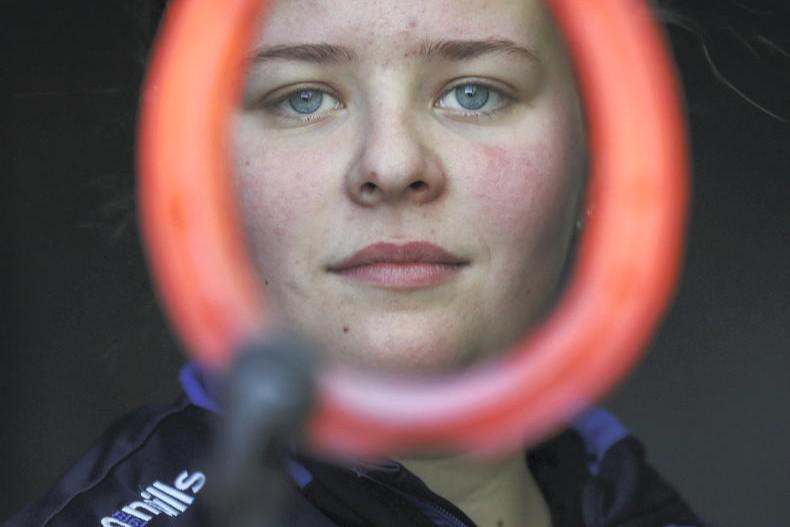
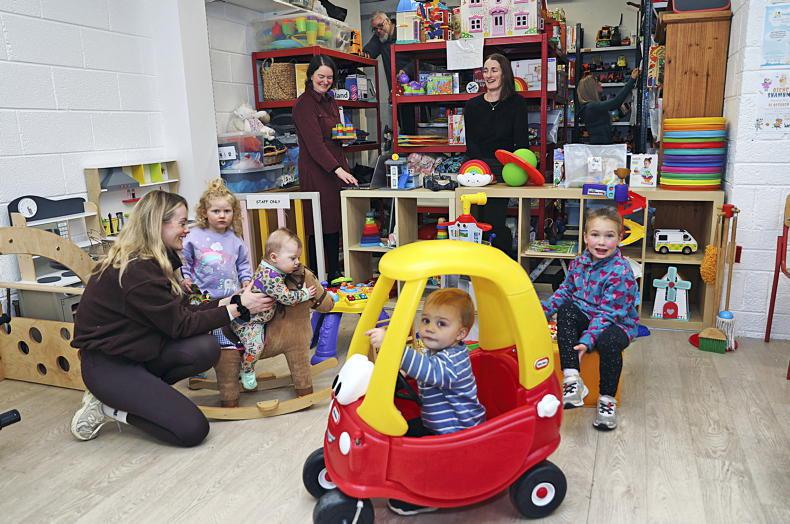
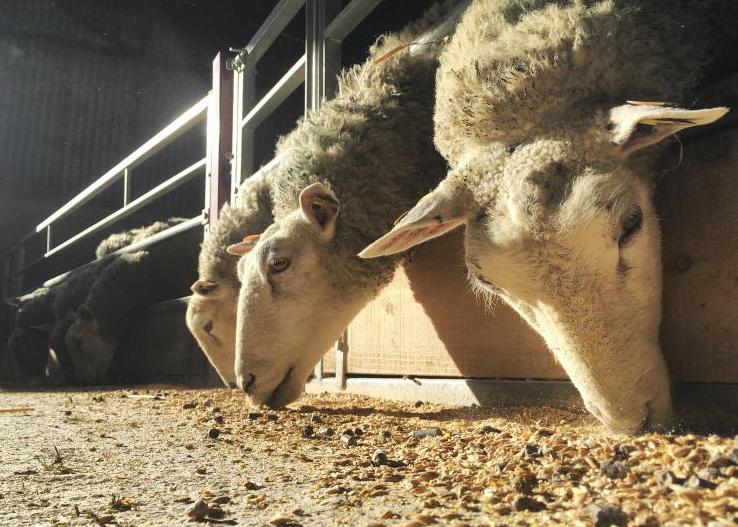
SHARING OPTIONS